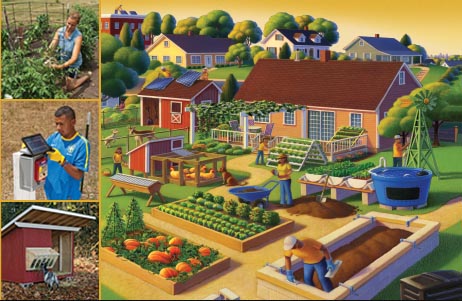Whether you’re already on a homestead or dreaming of being a homesteader, homesteading skills are invaluable – and lots of fun! They give you a real sense of accomplishment, you save money, and you’re becoming more self-reliant in the process.
Jump right in with the homesteading skills on this list. I’ve mainly included practical homesteading ideas – projects you can sink your teeth in today. One warning… Once you get started, you won’t be able to stop – homesteading is addictive!
Homesteading Skills and Ideas
I hope this list serves you as a source of inspiration for new homesteading skills, going back to a more simple life. Start by doing just one, pick a skill that sounds like fun (fun things are so much easier to learn!). Enjoy!
Gardening Skills
1. Germinate a Fruit Tree From Seed
You may have been told that you need to grow grafted fruit trees for a successful harvest. This isn’t true. You can grow resilient, fast-growing fruit trees by growing them from seed. And you can harvest the seed for free, from the fruit you buy!
Seed-grown fruit trees take a bit longer to fruit, that’s true. But, you’re getting a tree that is more adaptable and stronger. They’re much less likely to fall over in a storm, for example. You can grow almost any fruit tree from seed, from avocados to mandarins.
2. Start a Worm Farm
Worm farms are a great way to recycle your kitchen scraps. They don’t smell and they’re small enough to fit anywhere, from a balcony to the backyard.
I have to be honest here. If you have a few animals, you probably won’t have enough scraps for a worm farm. My dogs, chickens, horses, and cattle clean me out of any scraps that come out of the kitchen.
That’s why I’ve installed a few in-ground worm farms. They’re super easy to DIY and the best thing is that they don’t need any TLC. This worm farm is totally self-sufficient because the worms are earthworms, not compost worms. When you have scraps leftover, you can feed them. When you don’t, the worm tube looks after itself.
3. Plant Perennial Plants for Food Security
Perennial plants are plants you don’t have to replant every season. Once you’ve planted them, you’ll reap the benefits for many years afterward. The more perennials you grow, the less work you have to do and the more your garden looks after itself.
We work hard to become more self-reliant, and this is a way to get your garden to look after itself too.
4. Build a Greenhouse to Extend Your Growing Season
Greenhouses come in all shapes and sizes, from tiny vertical ones for your patio to giant hoop-style houses for large homesteads. Learning how to build a greenhouse is a useful homesteading skill to learn, particularly in cooler climates.
You can start propagating your vegetables a few weeks earlier and really extend your growing season. If you build a large greenhouse you can even grow vegetables inside and grow different varieties for your climate.
In hot climates, you may need to look at building a shade house rather than a greenhouse.
5. Plant Pollination Species
Fact is, without pollination you have no food. Learn about plants that attract pollinators in your area and plant them around your gardens. Plant lots of flowers, particularly native varieties. The aim is to have something flowering at all times.
Read more: Outdoor Happens




